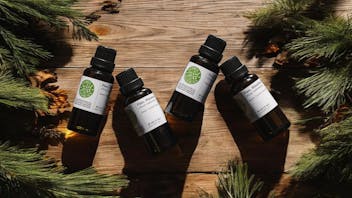Product Overview
Our non-GMO, nature-derived solubilizer is obtained through non-ionic hydrolysis (saponification) of sunflower seed oil. The purpose of a solubilizer is to uniformly disperse essential oils and other aromatics into water or water-based products. This solubilizer, when used according to recommended dilution ratios, can be used to dissolve aromatics into formulations such as facial mists, body sprays, gels, and water-based cleansers without diminishing foaming properties or leaving a sticky feel. An unusual offering, our solubilizer is extremely gentle, suitable for sensitive skin, and provides beneficial skin conditioning properties.[1] It is also 100% biodegradable.
Essential oils by nature are hydrophobic (insoluble in water) and without the use of a solubilizer, they will not mix with water. Any essential oil added to water would float in a thin layer on the surface and would need to be thoroughly shaken before every use in order to disperse the oil. Shaking alone is an imperfect solution when formulating and can result in uneven application. The addition of a solubilizer will mean the first application of your product will contain the exact same quantity of aromatics as the last!
For cosmetic applications, it is better to use a solubilizer to incorporate aromatic oils into your water-based formulations rather than using a high proof alcohol. Alcohol itself can be very drying if applied to the face or skin in large concentrations and is recommended for natural perfumery only. Also, please note that care must be taken when using essential oils in facial sprays as even solubilized oils may enter and irritate the eyes.
For best results, we strongly recommend keeping the dilution ratio of essential oils to <1% in formulations. We have had the best results using a 4:1 ratio (by weight, not volume): 4 parts solubilizer to 1 part essential oil(s). Sample formula (by weight):
95% distilled water or hydrosol
4% solubilizer
1% essential oil(s)
This solubilizer is not suitable for use with all aromatic oils carried by Eden Botanicals – simple testing will be required to confirm compatibility. Essential oils that are thick and viscous (e.g., Sandalwood or Vetiver) and aromatics that contain plant waxes or particulate matter (such as CO2 extracts and absolutes) may not be fully soluble. If the solution created is cloudy or shows signs of separation, full solubilization has not been reached and the formulation may not be stable. To troubleshoot, it may be necessary to increase the ratio of solubilizer to aromatic extract (try increasing solubilizer ratio to 8:1 or higher until final solution is clear).
1 Industry communication.



